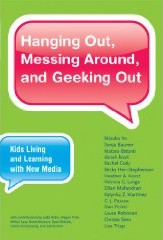 I am delighted to announce that “Hanging Out, Messing Around, and Geeking Out: Kids Living and Learning with New Media” is now in the wild and available! This book was written as a collaborative effort by members of the Digital Youth Project, a three-year research effort funded by the John D. and Catherine T. MacArthur Foundation and conducted at the University of California, Berkeley, and the University of Southern California. The project was spearheaded by Mimi Ito and my late advisor Peter Lyman. I had the honor of being one of the members of this group and led one of the chapters in this book (the one on “Friendship”). If you’re trying to understand the diversity of youth practices involving new media, this is a book for you!
I am delighted to announce that “Hanging Out, Messing Around, and Geeking Out: Kids Living and Learning with New Media” is now in the wild and available! This book was written as a collaborative effort by members of the Digital Youth Project, a three-year research effort funded by the John D. and Catherine T. MacArthur Foundation and conducted at the University of California, Berkeley, and the University of Southern California. The project was spearheaded by Mimi Ito and my late advisor Peter Lyman. I had the honor of being one of the members of this group and led one of the chapters in this book (the one on “Friendship”). If you’re trying to understand the diversity of youth practices involving new media, this is a book for you!
Conventional wisdom about young people’s use of digital technology often equates generational identity with technology identity: today’s teens seem constantly plugged in to video games, social networks sites, and text messaging. Yet there is little actual research that investigates the intricate dynamics of youth’s social and recreational use of digital media. “Hanging Out, Messing Around, and Geeking Out” fills this gap, reporting on an ambitious three-year ethnographic investigation into how young people are living and learning with new media in varied settings-at home, in after school programs, and in online spaces. By focusing on media practices in the everyday contexts of family and peer interaction, the book views the relationship of youth and new media not simply in terms of technology trends but situated within the broader structural conditions of childhood and the negotiations with adults that frame the experience of youth in the United States.
Integrating twenty-three different case studies-which include Harry Potter podcasting, video-game playing, music-sharing, and online romantic breakups-in a unique collaborative authorship style, “Hanging Out, Messing Around, and Geeking Out” is distinctive for its combination of in-depth description of specific group dynamics with conceptual analysis.
You can also download a PDF of the book, thanks to MIT Press. All proceeds from purchases of the book go to the Peter Lyman Graduate Fellowship in New Media at the University of California-Berkeley.
This project was one of many funded by the MacArthur Foundation to explore digital media and learning. New projects in this area are being aggregated through the Digital Media and Learning Hub. If you are interested in this area of work, you should also consider attending the first annual Digital Media and Learning Conference in February in San Diego.

You might mention that it is a free downloadable PDF from the MIT press site:
http://mitpress.mit.edu/catalog/item/default.asp?ttype=2&tid=11889
Thanks Danah! (especially for the E-Book Pdf version for those of us who spend too much time in front of the pc!) ^.^
Congratulations! Your work (and the .pdf.. ;-)) has been very valuable in our own project on “Growing up with the social web” where we researched Internet Use among German 12- 24year-olds.
Just bought my copy, danah!
And no joke….thanks for what you do! I’m not sure there is a single thinker whose work I enjoy more than yours. Your insights challenge me on a pretty regular basis and that’s just plain cool.
Be well,
Bill
Fantastic read! Once again, very education and it rings true with my own experiences. Two things, though: One, there has never been, to my knowledge, a game based on “Ender’s Game” (a bit weird that one of your subjects claimed to have played it), and two, a big part of the reason why people engage in quick turnarounds on fansubs is to increase their own reputation and standing within their community. I saw this reflected heavily in the “cracking” groups of the 90s (and it probably continues today).
These young people would find ways to break copyright protection on games so that they could be shared freely, but to the confusion of most outsiders, they did NOT do this for money. They formed highly organised groups across several different continents, worked very hard, raised to many challenges, and mainly it was for status and reputation.
Just something to take into consideration when talking about “geeking out”.
Looks like I should have finished reading before posting my previous comment. Lol.